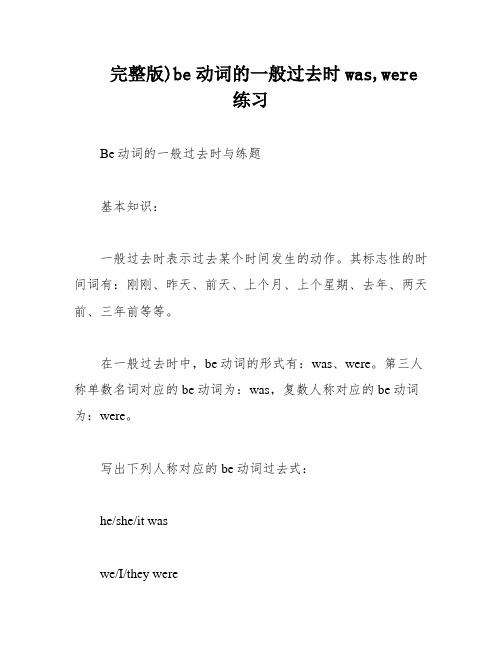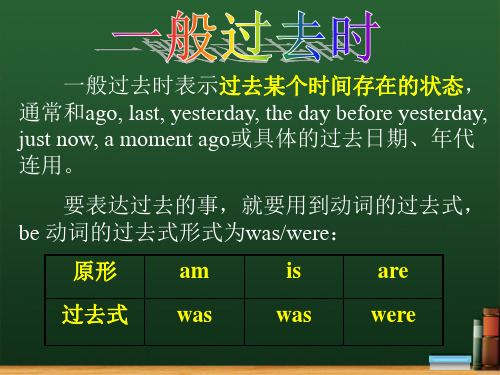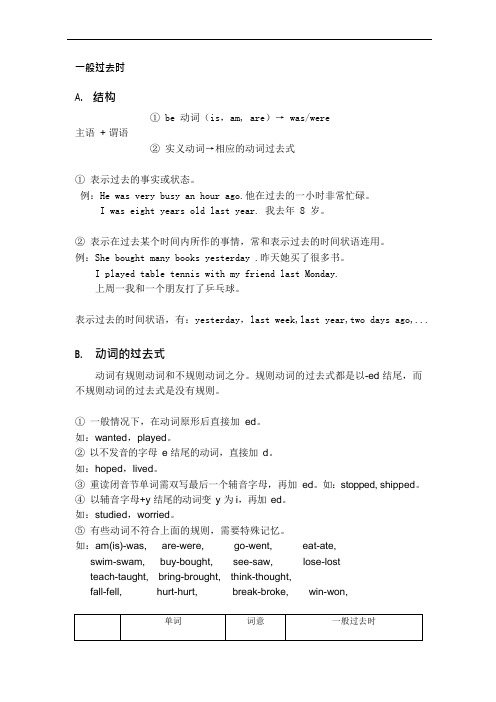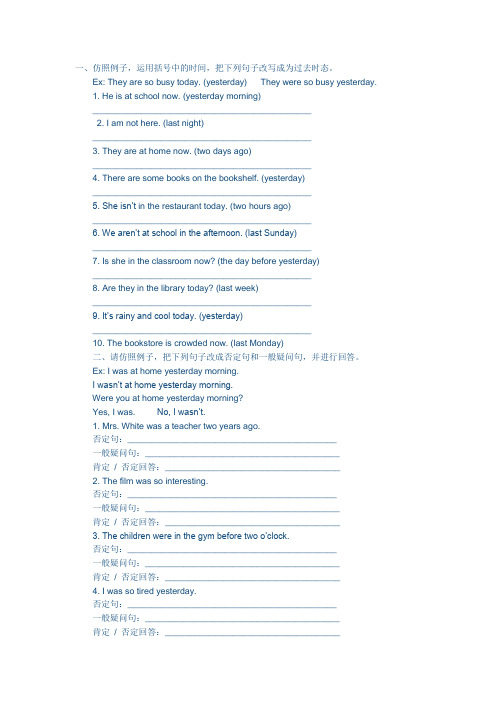(完整word版)Be动词的一般过去时
完整版)be动词的一般过去时was,were练习

完整版)be动词的一般过去时was,were练习Be动词的一般过去时与练题基本知识:一般过去时表示过去某个时间发生的动作。
其标志性的时间词有:刚刚、昨天、前天、上个月、上个星期、去年、两天前、三年前等等。
在一般过去时中,be动词的形式有:was、were。
第三人称单数名词对应的be动词为:was,复数人称对应的be动词为:were。
写出下列人称对应的be动词过去式:he/she/it waswe/I/they wereBe动词的句型转换:变否定:直接在be动词后加not,即was not/were XXX't。
变疑问:be动词提到句子最前面,即主语前面。
巩固练:一、从下列各题后所给的四个选项中选择最佳答案填空。
1.XXX.2.Were your parents at home last week?3.XXX last year。
They are here now.4.Was your father at work the day before yesterday?5.Who was on duty last Friday。
I was.二、用be动词的适当形式填空。
1.I was at school just now.2.He was in Wuhan last week.3.We were students two years ago.4.They were on the XXX.5.Yang Ling was eleven years old last year.6.There was an apple on the XXX.7.There was some milk in the fridge on Sunday.8.The mobile phone was on the XXX.三、根据时间改写句子。
1.改写前:I am at school just now。
改写后:I was atschool just now.2.改写前:He is in Wuhan this week。
(完整word版)一般过去时及特殊疑问句

一般过去时一、一般过去时的简介:定义:表示过去某时发生的动作或存在的状态.结构:“主语+动词的过去式”用法:1。
表示过去某个时间发生的动作或存在的状态。
He was here yesterday.I got up at seven yesterday morning.My mother was at work yesterday afternoon.Did you have a good time last summer?2。
表示过去经常或反复发生的动作。
My mother often went to work by taxi last year.When I was a student, I often listened to music.3。
常与一般过去时态连用的时间有:at that time, then, at that moment, yesterday, yesterday morning (afternoon, evening…)last night (week, month, year…),一段时间+ago(several days ago), two days ago, a week ago, three years ago…in 1990,(in 1997…) ,just now, long before, long long ago二. 动词过去式构成规则1、一般在动词原形末尾加– edhelp → helped, look → looked, play → played, work → worked, listen → listened, wash →washed, clean → cleaned,2、结尾是 e 的动词加 -- dlive--—lived hope———hoped use-—-used like ——- liked3、末尾只有一个辅音字母的重读闭音节,先双写这个辅音字母,再加-ed。
be动词的一般过去式

be 动词一般过去时否定句: 主语+be动词(was/were)+not+其他 I was not at home last night.
我昨天晚上不在家。
He was not tall when he was young.
他小时候长的不高。
We were not in Shanghai last year.
过去式
am
was
is
was
are
were
be 动词一般过去时肯定句:
主语+be动词(was/were)+其他
She was very busy yesterday.她昨天很忙。 She was very sad last week.她上周很伤心。 He was at school lat Tuesday.他上周二在学校。 They were my friends.他们以前和我是朋友。
一般过去时表示过去某个时间存在的状态, 通常和ago, last, yesterday, the day before yesterday, just now, a moment ago或具体的过去日期、年代 连用。
要表达过去的事,就要用到动词的过去式, be 动词的过去式形式为was/were: 原形
我们去年不在上海。
be 动词一般过去时一般疑问句: be动词(was/were)+ 主语+其他 Was he in the zoo? 他在动物园吗? Were you in the playground just now?
你们刚刚在操场吗?
Were they at home last night?
他们昨天晚上在家吗?
be 动词一般过去时特殊疑问句:
(完整版)小学英语一般过去时总结(可编辑修改word版)

一般过去时A.结构① be 动词(is,am, are)→ was/were主语+ 谓语②实义动词→相应的动词过去式①表示过去的事实或状态。
例:He was very busy an hour ago.他在过去的一小时非常忙碌。
I was eight years old last year. 我去年 8 岁。
②表示在过去某个时间内所作的事情,常和表示过去的时间状语连用。
例:She bought many books yesterday .昨天她买了很多书。
I played table tennis with my friend last Monday.上周一我和一个朋友打了乒乓球。
表示过去的时间状语,有:yesterday,last week,last year,two days ago,...B. 动词的过去式动词有规则动词和不规则动词之分。
规则动词的过去式都是以-ed 结尾,而不规则动词的过去式是没有规则。
①一般情况下,在动词原形后直接加ed。
如:wanted,played。
②以不发音的字母e 结尾的动词,直接加d。
如:hoped,lived。
③重读闭音节单词需双写最后一个辅音字母,再加ed。
如:stopped, shipped。
④以辅音字母+y 结尾的动词变y 为i,再加ed。
如:studied,worried。
⑤有些动词不符合上面的规则,需要特殊记忆。
如:am(is)-was, are-were, go-went, eat-ate,swim-swam, buy-bought, see-saw, lose-lostteach-taught, bring-brought, think-thought,fall-fell, hurt-hurt, break-broke, win-won,直接加edwalk 走climb 爬turn 转弯learn 学习cook dinner 做饭play the piano 弹钢琴visit grandparents 看望(外)祖父母clean the bedroom 打扫卧室wash the clothes 洗衣服answer the phone 接电话listen to music 听音乐clean the room 打扫房间collect insects 收集昆虫jump 跳row 划work 工作show 展示look 看help 帮助relax 放松return 归还pass 传递watch insects 观察昆虫pick up leaves 采摘树叶paint 绘画kick 踢ski 滑雪直接加dlike 像,喜欢live 居住dance 跳舞use a computer 使用计算机love 爱taste 尝close 关上prepare 准备不规则变化eat 吃have 有;吃buy 买take 买;带go 去sing 唱歌teach(taught)教run(ran)跑fight(fought)打架get up 起床swim 游泳fly 飞swing(swung)荡sleep(slept)睡觉sweep(swept) the floor 扫地do 做make the bed 铺床draw(drew) pictures 画画write(wrote) a letter 写信catch(caught)butterflies 捉蝴蝶meet(met) 见面drink(drank)喝tell(told)告诉ride(rode)骑find(found)寻找到drive(drove)驾驶come(came)来become(became)变成feel(felt)感觉到think(thought)思考meet(met)遇见fall(fell)落下leave 离开wake(woke) up 醒来bring 带来is am are see 看到grow 种植grew stand(stood)站立词形不变read books 读书put 放set the table 摆饭桌hit (hit)撞击、打cut 切、割最后一个字母双写再加edstop(stopped)停shop 购物把y 变成i 再加edempty the trash 倒垃圾study 学习C. 过去式的肯定、否定、疑问及简短回答①过去式的肯定、否定、疑问及简短回答的形式可表示如下:肯定句I (He, She, We, You, They) went there by bus.否定句I (He, She, We, You, They) didn't go there by bus.疑问句Did I (he, she, we, you ,they) go the by bus?简短回答Yes, I (He, She, We, You, They) did.No, I (He, She, We, You, They) didn't.动词be 的肯定、否定、疑问及简短回答形式如下:肯定句I (He, She) was there.We (You, They) were there.否定句I (He, She) wasn't there.We (You, They) weren't there疑问句Was I (he, she) there?Were we (you, they) there?简短回答No, I (he, she) wasn't.we (you, they) weren't.一、将下列动词变成过去式。
(完整版)be动词的一般过去时练习

一、仿照例子,运用括号中的时间,把下列句子改写成为过去时态。
Ex: They are so busy today. (yesterday) They were so busy yesterday.1. He is at school now. (yesterday morning)_____________________________________________2. I am not here. (last night)_____________________________________________3. They are at home now. (two days ago)_____________________________________________4. There are some books on the bookshelf. (yesterday)_____________________________________________5. She isn’t in the restaurant today. (two hours ago)_____________________________________________6. We aren’t at school in the afternoon. (last Sunday)_____________________________________________7. Is she in the classroom now? (the day before yesterday)_____________________________________________8. Are they in the library today? (last week)_____________________________________________9. It’s rainy and cool today. (yesterday)_____________________________________________10. The bookstore is crowded now. (last Monday)二、请仿照例子,把下列句子改成否定句和一般疑问句,并进行回答。
be动词的一般过去式用法与练习(汇编)

be动词的一般过去时详细讲解与练习动词be的一般过去时详细讲解与练习题,英语学习-巧学动词be 的一般过去时学习动词be的一般过去时,下面有一口诀,它可以帮你们更好地掌握动词be的一般过去时。
be 的过去时有四巧:一是时间状语巧,表示过去的短语要记;二是形式巧,单数was,复数were;否定句结构是三巧,not紧跟was/were;四是疑问句式巧,was/were向前跑(提前)。
【一巧】时间状语巧。
一般过去时表示过去发生的动作或存在的状态,恰巧与表示过去的一些时间状语连用。
例如:yesterday, last night/week/month/year, last Saturday, thedaybefore.yesterd ay, in 1998, five years ago等。
【二巧】形式巧。
它与一般现在时一样,形式多样:当主语是第一人称单数或第三人称单数时,谓语动词用was;主语是第二人称或其他人称复数时,谓语动词用were。
例如:I was in the classroom yesterdaymorning.昨天早上我在教室里。
He was at school last Tuesday.上周二他在学校。
They were over there a moment ago.刚才他们在那边。
【三巧】否定句结构巧。
与动词be的一般现在时一样,它在动词后面加not即可变成否定句,并且was, were与not 可以缩写成wasn't, weren't。
即:主语+wasn't/weren't +表语+其他。
例如:I was not (=wasn't)here yesterday.昨天我不在这儿。
My parents were not (=weren't) at homelast Sunday.上周日我父母不在家。
【四巧】疑问句式巧。
把was, were提到句首,句末用问号即可变为一般疑问句。
be动词的一般过去时

be 动词的过去式
原形
am
否定缩略式 am not
过去式 was
否定缩略式 wasn’t
is isn’t was wasn’t
are aren’t were weren’t
学习动词 be 的一般过去时,下面有 一口诀,它可以帮大家更好地掌 握动词 be 的一般过去时。 动词 be 的过去时有四巧: 一是时间状语巧,表示过去的短语要 记牢;二是形式巧,单数 was,复数 were;否定句结构是三巧,not 紧跟 was/were;四是疑问句式巧, was /were 向前跑(提前)。
【四巧】 疑问句式巧。把 was, were 提到句首,句末用问号即可变为一般 疑问句。即:Was (Were) + 主语 + 表 语 + 其他?这恰巧与动词 beu at home the day before yesterday? 前天你在家吗? Was she late this morning? 今天早上她迟到了吗? 更巧的是疑问句的答语也相似,肯定 回答用“Yes, 主语 + was/were.”; 否定回答用“No, 主语 + wasn’t/ weren’t.”。
3. — _W__a_s__ Daming born in Beijing. —Yes, he __w_a_s__.
4. —_W__e_r_e__ they at school on Monday? —No, they w__e_r_en__’t_.
5. —__W__e_r_e_ they at home this morning? —No, they w__e_r_e_n_’_t .
6. —__W__a_s__ your first teacher strict? —Yes, she __w_a_s__.
(完整版)一般过去时习题及答案

一般过去时一、用法1. 表示过去某个时间发生的动作或存在的状态。
I got up at 7:00 yesterday morning. 昨天早上我七点钟起床的。
2. 表示过去经常或反复发生的动作,可以与always, often, sometimes等频度副词连用。
I often had lunch at school last month. 上个月我经常在学校吃午餐。
二、表现形式1. 句中含有be动词,则be动词改成was (主语是第一或第三人称单数)或were (主语是第二人称或第一、三人称复数)。
I was at home at that time. 那时我在家里。
2. 如果句中有实义动词,使用实义动词的过去式。
She went to Jinan last Sunday. 上周日她去济南了。
3. 句式转换(1)含有be动词的一般过去时态的各种句式:①肯定句:主语+was/were+其他.Linda was thirteen last year. 去年琳达13岁。
②否定句:主语+was/were+not+其他.Mary was not good at math. 玛丽不擅长数学。
③一般疑问句:Was/Were+主语+其他?肯定回答:Yes, 主语+was/were.否定回答:No, 主语+was/were+not.—Was Mary ill last week? 上周玛丽生病了吗?—Yes, she was. 是的,她生病了。
(2)含有实义动词的一般过去时态的各种句式:①肯定句:主语+动词的过去式+其他.Mike went to the cinema yesterday evening. 昨天晚上迈克去看电影了。
②否定句:主语+didn't+动词原形+其他.My mother didn't go to work yesterday.昨天我妈妈没去上班。
③一般疑问句:Did+主语+动词原形+其他?肯定回答:Yes, 主语+did.否定回答:No, 主语+didn't.—Did she go to the zoo? 她去动物园了吗?—No, she didn't. 不,她没去。
- 1、下载文档前请自行甄别文档内容的完整性,平台不提供额外的编辑、内容补充、找答案等附加服务。
- 2、"仅部分预览"的文档,不可在线预览部分如存在完整性等问题,可反馈申请退款(可完整预览的文档不适用该条件!)。
- 3、如文档侵犯您的权益,请联系客服反馈,我们会尽快为您处理(人工客服工作时间:9:00-18:30)。
由be动词构成的一般过去时
课堂练习
一、用be动词的适当形式填空
1.I _______ at school just now.
2.He ________ at the camp last week.
3.We ________ students two years ago.
4.They ________ on the farm a moment ago.
5.Yang Ling ________ eleven years old last year.
6.There ________ an apple on the plate yesterday.
7.There ________ some milk in the fridge on Sunday.
8.The mobile phone _______ on the sofa yesterday evening.
二、根据时间改写句子
1.Today is Monday. (the day before yesterday)
2.There are 23 students in our class. (22, yesterday)
3.I am in Grade Two this year. (last year)
4.My father is 44. (ten years ago)
5.We are in No 9 Middle School. (3 years ago, XXX Primary School 小学)
6.He is in Beijing. (last night, Hong Kong)
7.Our teacher is better now. (last week, ill)
8.My parents are at home today. (yesterday, at work)
三、改写句子
1. Joy was in Grade One last year.
否定句:
一般疑问句:
肯定回答:
否定回答:
特殊疑问句:
2. Lily was in Qingdao yesterday.
否定句:
一般疑问句:
肯定回答:
否定回答:
特殊疑问句:
3. I was at home the day before yesterday.
否定句:
一般疑问句:
肯定回答:
否定回答:
特殊疑问句:
4. The twins were in a primary school last term.
否定句:
一般疑问句:
肯定回答:
否定回答:
特殊疑问句:
四、选择填空
( ) 1.My father______ill yesterday.
A.isn’t B.aren’t C.wasn’t D.weren’t
( ) 2.______your parents at home last week﹖
A.Is B.Was C.Are D.Were
( ) 3.The twins__in Dalian last year.They__here now.
A.are; were B.were; are C.was; are D.were; was ( ) 4.___your father at work the day__yesterday﹖
A.Was; before B.Is; before C.Was; after D.Is; after ( ) 5.—Who was on duty last Friday﹖—______.
A.I am B.I was C.Yes, I was D.No, I wasn't
课后作业一
一、基本知识
1.一般过去时中,be动词的形式有:______、______;第三人称、单数名
词对应的be动词为______ ;复数人称对应的be动词为______
2.写出下列个人称对应的be动词过去式:
he _______ you _______ she _______ it _______ we _______ I _______ they _______ he _______ 3.be动词的句型转换:
变否定:直接在be动词后加not, 即:was + not = wasn’t were+not= weren’t 变疑问:be动词提到句子最前面,即主语前面
特殊疑问:特殊疑问词+ 一般疑问句
4.用be动词对应的过去时填空,并将句子变为否定句
1)My mother ______ a teacher. → _______________________________
2)His parents ______ farmers. → _______________________________
3)He ______ a lazy boy →________________________________
4)She ______ a college student. →________________________________
5)The news ______ exciting. →________________________________
6)My classmate ______ kind →________________________________
7)I ______ a player. →________________________________ 5.用be动词的适当形式填空。
1)I ______ an English teacher now.
2)She _______ happy yesterday.
3)They _______ glad to see each other last month.
4)Helen and Nancy ________ good friends.
5)The little dog _____ two years old this year.
6)Look, there ________ lots of grapes here.
7)There ________ a sign on the chair on Monday.
8)Today _____ the second of June. Yesterday ______ the first of June. It _____
Children’s Day. All the students ______ very excited.
课后作业二
一、用be动词的过去式填空,并将句子变成否定和疑问句
1. You _____ a student.
否定: ___________________________ 疑问: ____________________________ 2. My father _____ a worker.
否定: ____________________________ 疑问: ___________________________ 3. I _____ a child.
否定: ____________________________ 疑问: ____________________________ 4. The students _____ my friends.
否定: ____________________________ 疑问: ____________________________ 5. Eli _____ an only-child.
否定: ____________________________ 疑问: ____________________________ 6. The house _____ dirty.
否定: ____________________________ 疑问: ____________________________ 7. The boy _____ the best student
否定: ____________________________ 疑问: ____________________________ 8. They _____ Japanese.
否定: ____________________________ 疑问: ___________________________ 9. The book _____ interesting.
否定: ____________________________ 疑问: ____________________________
二、翻译
1.昨天早上我在教室里。
2.上周二他在学校。
3.刚才他们在那边。
4.昨天我不在这儿。
5.上周日我父母不在家。
6.他在动物园吗?
7.今天早上她迟到了吗?。
